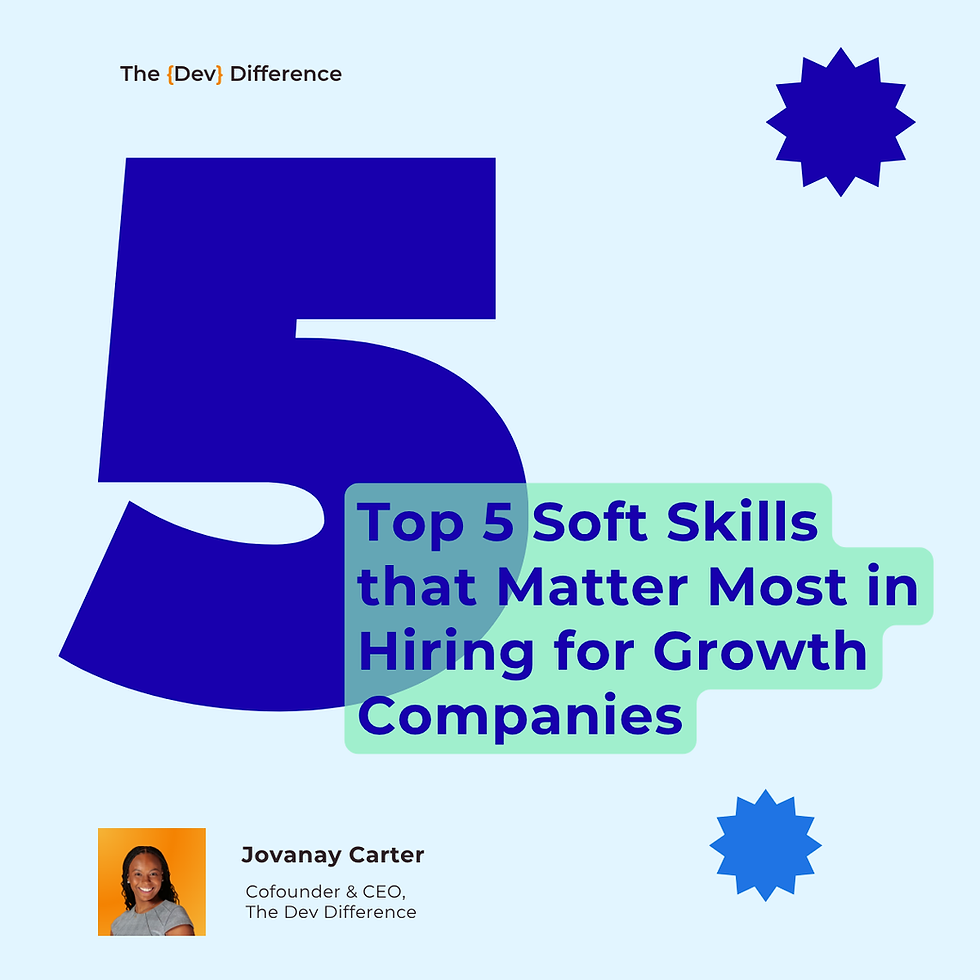Why We Don't Use LeetCode Questions to Hire Our Software Engineers—And Why You Shouldn’t Either
- Jovanay Carter
- Jul 6
- 3 min read

When I was at Google, we would ask senior software engineers who had 8, 10, or 12 years of experience to interview with us, and they would ask to take 2–3 months studying Leetcode before being ready to interview. I was flabbergasted.
Although Leetcode is helpful for a junior software engineer, first practicing algorithmic concepts on their own, it should not drastically dictate how we hire developer talent. If you're a senior software engineer at a top company, and you are already performing at such a high level, there’s no reason you shouldn't be able to jump into a similar codebase and get going. So what was with this Leetcode time-wasting mountain?
When we hired our first software engineer at The Dev Difference, we refused to ask any LeetCode questions and here’s why:
They can literally Google or memorize it. There are entire forums and YouTube channels dedicated to solving these questions. You're not testing problem-solving—you’re testing short-term recall.
AI could've done that. If AI can already solve LeetCode questions, why are we still using them to evaluate humans? Yes, we want to ensure candidates know code without AI, but isn't our job as hiring teams to create a more interesting hiring tactic also?
It assumes they’re starting from scratch—which never happens in a real dev team. Jumping into an existing codebase is a challenge in itself. We want to see if someone will take 2 weeks to figure that out or if they can immerse themselves quickly.
It doesn’t test how fast they think or how they make decisions. Real dev work, especially at a startup like ours, is fast-paced and takes resourcefulness and true comfort with code. We wanted to see how candidates think on their feet.
It doesn’t reflect the actual job. Most engineers spend their time debugging issues, improving features, and translating product requirements, not reversing linked lists.
So instead, we built our own process. Keep in mind, this was our 'final interview loop', done a few days after a 20 minute behavioral pre-screen:
Part 1: 15 minutes of behavioral questions to understand technical experience and motivation.
Part 2: 15 minutes of a debugging task to understand if they can debug a messy AI-generated example codebase.
Part 3: 20 minutes of a system design whiteboard interview based on a real feature from our roadmap.
What we learned was so valuable.
The behavioral questions quickly showed us who was actually motivated to work on our product and in a small engineering team and who could communicate their previous experiences to all types of audiences.
The debugging round helped us quickly assess skills like would read they read the README before getting started (which we intentionally put answers in), who panicked vs. who enjoyed the problem solving process when errors came up, what kind of questions they asked, who knew the coding language, and who needed constant direction.
The system design round showed us who thought strategically vs who might have needed a little extra guidance to figure out problems.
A process that would've taken 4–5 team-members and a "Superday" of 6 hours of interviews per candidate at other companies was now condensed into 1 hour of interviews run by a 2-person team.
Since then, we’ve run this same structure for other small companies—like a marketing agency hiring a fullstack developer. They credited the customizable process and easy-to-implement format to their success in quickly identified the right hire.
In the age of AI, engineers shouldn’t be tested on what ChatGPT or Claude can already do. They should be challenged to think critically, move fast, and design real systems.
And if you don’t have time to build a process like this or need the technical help to build one for your team, that’s exactly why we built The Dev Difference's Employer Assessment Tool.
We wanted to systematize the process of creating holistic assessments with behavioral, technical, and fit-based questions in a 30–60 minute interview that our AI agents can conduct as a prescreen for you—so you can find the best-fit candidates with a process that is undeniable and far more interesting for candidates.
Either way, whether you use our platform or build your own version—engineers are smart, capable and deserve a much better interview experience.
—
This article was written by Jovanay Carter, Co-Founder and CEO of the The Dev Difference. Subscribe to thedevdifference.com's newsletter for holistic technical assessments and tech-industry hiring topics.



Comments